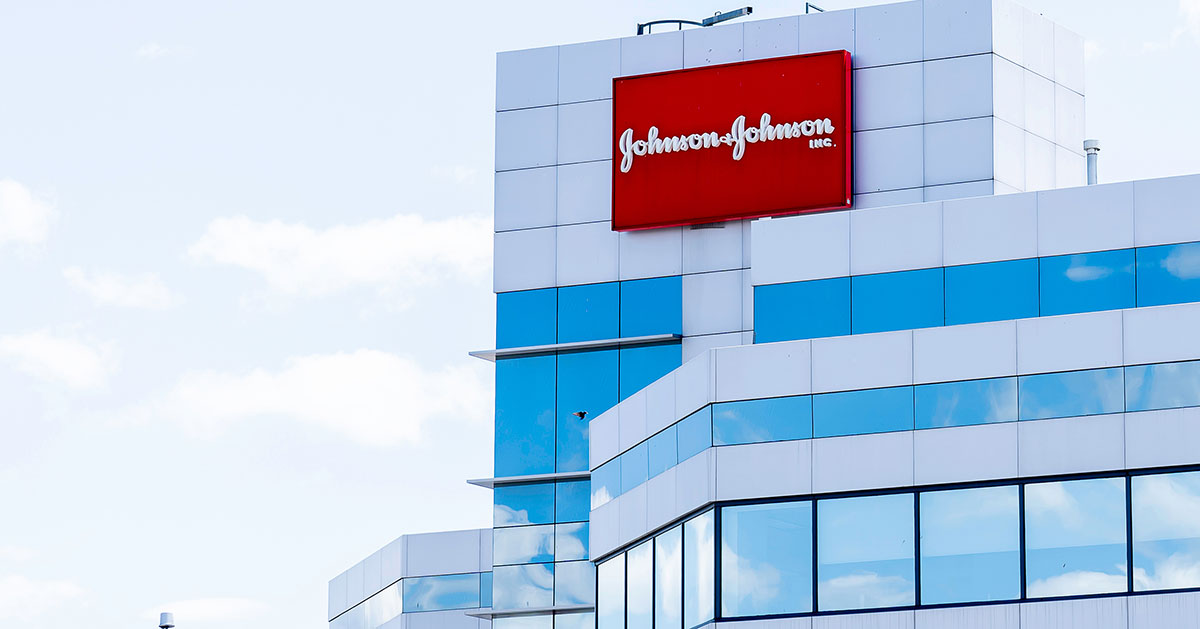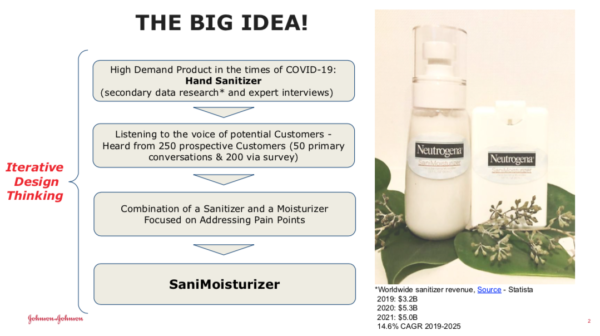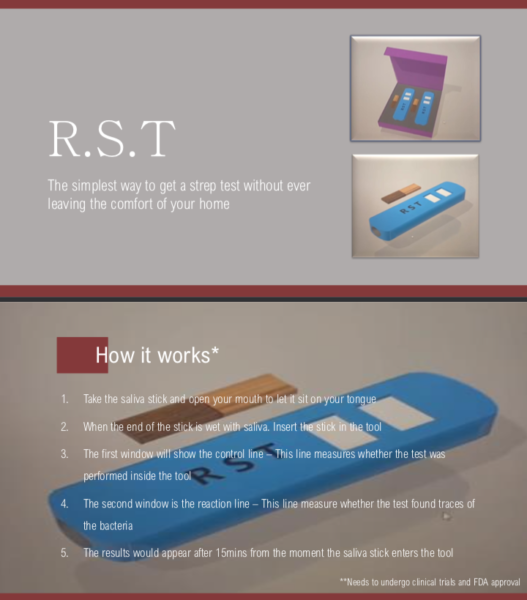A Sanitizer-Moisturizer Combo and At-Home Strep Test? Babson MBAs Pitch Projects to Johnson & Johnson

Nathalya Mamane MBA’21 is a parent of four children. Like most working mothers—never mind those balancing the pursuit of a graduate degree—she has little free time to waste.
Trips to the doctor for things such as strep-throat tests, which often come back negative, can feel like an unnecessary nuisance. So, Mamane asked, with the popularization of telemedicine during the pandemic, why couldn’t these tests be conducted from home?
“We were trying to be creative and find something new for a well-established company,” Mamane said. “What we discovered over the process was that doctors need and want this.”
When Babson students have a good idea, they also have the support system and tools to bring it to life, which is exactly what Mamane and nine of her MBA peers—Fahid Naseer MBA’21, Rohan Bahri MBA’22, Alexander Oubre MBA’22, Abishek Pathania MBA’22, Ashley Patterson MBA’22, Rajeev Ranjan MBA’22, Sukreet Singh MBA’22, Jason Splaine MBA’22, and Benjamin Valdes Vasquez MBA’22—had the chance to do when they presented a pair of COVID-exacerbated constraint projects to representatives from Johnson & Johnson.
Mixing Moisturizer with Sanitizer
Splaine and the rest of the team also latched onto a frequently discussed but seldomly solved problem associated with the pandemic: hand sanitizer. Everyone needs it (along with proper hand-washing techniques), but the downside to both protective measures is the toll the consistent use of these disinfecting agents can take on our skin.
The team’s solution was to create a moisturizer with at least 60 percent ethyl alcohol, offering sanitizing properties without excessively drying out users’ skin.
“We wanted to offer people a path to normalcy,” Oubre said. “Hand sanitizing, regardless of the pandemic, is here to stay. Consumer behavior is forever changed.”
The team found success by incorporating a variety of opinions from men and women, and by leaning into the expertise of potential customers and taking their feedback to heart.

“It was an iterative process to make sure we were being as comprehensive and responsive to potential customers as we could be,” said Splaine, whose great-grandfather, George Crowe, worked for Johnson & Johnson as a material scientist and was credited with the patent for the kling bandage.
“Thinking about the legacy of J&J as a company, it was pretty cool to have been a small part of something so much larger than ourselves,” Splaine said.
Oubre said the group’s diverse opinions was representative of the Babson College experience.
“We had people from multiple different continents, four different religious backgrounds,” Oubre said. “Working together as a team, allowing room for spirited debate, we were able to build unique connections and appreciate the differences in each other.”
An Injection of Fresh Thinking
Mamane walked away from the team’s pitch to Johnson & Johnson invigorated and ready to apply the representatives’ advice in her own work and life.
“Your idea means nothing until you really develop it,” she said. “An idea is great, don’t be too emotionally attached to it.”
Patterson looked at the pitch as practice, one that will help her in the future as she develops her leadership skills.
“My focus was about learning along with my colleagues,” she said. “That’s why I’m in the MBA program, to grow as an individual. … To be able to get their feedback, it was valuable.”
That feeling of developing resilience is a good thing, one that is needed in MBA students, says Associate Professor Patricia Guinan, who goes by “PJ” to students and colleagues.

“Students working with a healthcare giant like this, it gives them an incredibly different perspective in terms of corporate entrepreneurship and corporate innovation,” she said. “Doing that in a corporation is very different than doing that in a startup and their ability to scale ideas with their resources is profound.
“To do innovation in health care is very difficult because of the demands placed on the ecosystem. There is often very little room for risk or failing fast in established companies because of the culture,” Guinan added. “Only the biggest and the best companies can reinvent themselves. Johnson & Johnson is one of those giants trying to operate like a longtime startup by supporting schools like us, deliberately trying to be more entrepreneurial.”
“Injecting outside thinking into a mature organization like J&J is invaluable. It brings fresh ideas and allows us to reconsider some of our strongly held assumptions.”
Jonathan Finer, Johnson & Johnson director of brand & innovation strategy
Johnson & Johnson director of brand & innovation strategy Jonathan Finer said his team plans to bring these ideas to appropriate audiences to determine their viability.
“The innovation process is complex, but I’m certain the great work from the students will be appreciated and considered,” Finer said.
Mike Reilly, global head of supply chain customer connectivity digital products at Johnson & Johnson, said the company benefits from learning how entrepreneurial leaders such as Babson students view digital brand capabilities.
“Injecting outside thinking into a mature organization like J&J is invaluable,” Finer said. “It brings fresh ideas and allows us to reconsider some of our strongly held assumptions.”
Posted in Community






